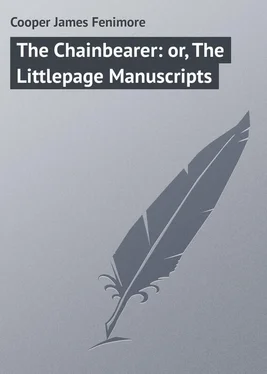James Cooper - The Chainbearer - or, The Littlepage Manuscripts
Здесь есть возможность читать онлайн «James Cooper - The Chainbearer - or, The Littlepage Manuscripts» — ознакомительный отрывок электронной книги совершенно бесплатно, а после прочтения отрывка купить полную версию. В некоторых случаях можно слушать аудио, скачать через торрент в формате fb2 и присутствует краткое содержание. Жанр: foreign_prose, на английском языке. Описание произведения, (предисловие) а так же отзывы посетителей доступны на портале библиотеки ЛибКат.
- Название:The Chainbearer: or, The Littlepage Manuscripts
- Автор:
- Жанр:
- Год:неизвестен
- ISBN:нет данных
- Рейтинг книги:5 / 5. Голосов: 1
-
Избранное:Добавить в избранное
- Отзывы:
-
Ваша оценка:
- 100
- 1
- 2
- 3
- 4
- 5
The Chainbearer: or, The Littlepage Manuscripts: краткое содержание, описание и аннотация
Предлагаем к чтению аннотацию, описание, краткое содержание или предисловие (зависит от того, что написал сам автор книги «The Chainbearer: or, The Littlepage Manuscripts»). Если вы не нашли необходимую информацию о книге — напишите в комментариях, мы постараемся отыскать её.
The Chainbearer: or, The Littlepage Manuscripts — читать онлайн ознакомительный отрывок
Ниже представлен текст книги, разбитый по страницам. Система сохранения места последней прочитанной страницы, позволяет с удобством читать онлайн бесплатно книгу «The Chainbearer: or, The Littlepage Manuscripts», без необходимости каждый раз заново искать на чём Вы остановились. Поставьте закладку, и сможете в любой момент перейти на страницу, на которой закончили чтение.
Интервал:
Закладка:
Such is the scale on which nature labors in the wilderness! I have seen insects fluttering in the air at particular seasons, and at particular places, until they formed little clouds; a sight every one must have witnessed on many occasions; and as those insects appear, on their diminished scale, so did the pigeons appear to us at the roost of Mooseridge. We passed an hour in the town of birds, finding our tongues and our other faculties, as we became accustomed to our situation. In a short time, even Dus grew as composed as at all comported with the excitement natural to one in such a place; and we studied the habits of the pretty animals with a zest that I found so much the greater for studying them in her company. At the end of the hour we left the hill, our departure producing no more sensation in that countless tribe of pigeons than our arrival.
"It is a proof that numbers can change our natures," said Dus, as we descended the little mountain. "Here have we been almost in contact with pigeons which would not have suffered us to come within a hundred feet of them, had they been in ordinary flocks, or as single birds. Is it that numbers give them courage?"
"Confidence, rather. It is just so with men; who will exhibit an indifference in crowds that they rarely possess when alone. The sights, interruptions, and even dangers that will draw all our attention when with a few, often seem indifferent to us when in the tumult of a throng of fellow-creatures."
"What is meant by a panic in an army, then?"
"It is following the same law, making man subject to the impulses of those around him. If the impulse be onward, onward we go; if for retreat, we run like sheep. If occupied with ourselves as a body, we disregard trifling interruptions, as these pigeons have just done in our own case. Large bodies of animals, whether human or not, seem to become subject to certain general laws that increase the power of the whole over the acts and feelings of any one or any few of their number."
"According to that rule, our new republican form of government ought to be a very strong one; though I have heard many express their fears it will be no government at all."
"Unless a miracle be wrought in our behalf, it will be the strongest government in the world for certain purposes, and the weakest for others. It professes a principle of self-preservation that is not enjoyed by other systems, since the people must revolt against themselves to overturn it; but, on the other hand, it will want the active living principle of steady, consistent justice, since there will be no independent power whose duty and whose interest it will be to see it administered. The wisest man I ever knew has prophesied to me that this is the point on which our system will break down; rendering the character, the person, and the property of the citizen insecure, and consequently the institutions odious to those who once have loved them."
"I trust there is no danger of that!" said Dus, quickly.
"There is danger from everything that man controls. We have those among us who preach the possible perfection of the human race, maintaining the gross delusion that men are what they are known to be, merely because they have been ill-governed; and a more dangerous theory, in my poor judgment, cannot be broached."
"You think, then, that the theory is false?"
"Beyond a question; governments are oftener spoiled by men, than men by governments; though the last certainly have a marked influence on character. The best government of which we know anything is that of the universe; and it is so, merely because it proceeds from a single will, that will being without blemish."
"Your despotic governments are said to be the very worst in the world."
"They are good or bad as they happen to be administered. The necessity of maintaining such governments by force renders them often oppressive; but a government of numbers may become more despotic than that of an individual; since the people will, in some mode or other, always sustain the oppressed as against the despot, but rarely, or never, as against themselves. You saw that those pigeons lost their instinct, under the impulse given them by numbers. God forever protect me against the tyranny of numbers."
"But everybody says our system is admirable, and the best in the world; and even a despot's government is the government of a man."
"It is one of the effects of numbers that men shrink from speaking the truth, when they find themselves opposed to large majorities. As respects self-rule, the colonies were ever freer than the mother country; and we are, as yet, merely pursuing our ancient practices, substituting allegiance to the confederation for allegiance to the king. The difference is not sufficiently material to produce early changes. We are to wait until that which there is of new principles in our present system shall have time to work radical changes, when we shall begin to ascertain how much better we really are than our neighbors." 13 13 At the time of which Mr. Mordaunt Littlepage is here speaking, it was far less the fashion to extol the institutions than it is to-day. Men then openly wrote and spoke against them, while few dare, at the present time, point out faults that every person of intelligence knows and feels to be defects. A few years since, when Jackson was placed in the White House, it was the fashion of Europe to predict that we had elevated a soldier to power, and that the government of the bayonet was at hand. This every intelligent American knew to be rank nonsense. The approach of the government of the bayonet among us, if it is ever to come, may be foreseen by the magnitude of popular abuses, against which force is the only remedy. Every well-wisher of the freedom this country has hitherto enjoyed, should now look upon the popular tendencies with distrust, as, whenever it is taken away, it will go as their direct consequence; it being an inherent principle in the corrupt nature of man to misuse all his privileges; even those connected with religion itself. If history proves anything, it proves this. – Editor.
Dus and I continued to converse on this subject until she got again into the saddle. I was delighted with her good sense and intelligence, which were made apparent more in the pertinacity of her questions than by any positive knowledge she had on such subjects, which usually have very few attractions for young women. Nevertheless, Dus had an activity of mind and a readiness of perception that supplied many of the deficiencies of education on these points; and I do not remember to have ever been engaged in a political discussion from which I derived so much satisfaction. I must own, however, it is possible that the golden hair flying about a face that was just as ruddy as comported with the delicacy of the sex, the rich mouth, the brilliant teeth, and the spirited and yet tender blue eyes, may have increased a wisdom that I found so remarkable.
CHAPTER XV
"Fie, fie, fond love, thou art so full of fear,
As one with treasure laden, hemmed with thieves,
Trifles, unwitnessed with eye or ear,
Thy coward heart with false bethinking grieves."
The hut, or huts of Chainbearer, had far more comfort in and around them, than I was prepared to find. They were three in number, one having been erected as a kitchen, and a place to contain the male slaves; another for the special accommodation of Ursula and the female black; and the third to receive men. The eating-room was attached to the kitchen; and all these buildings, which had now stood the entire year, were constructed of logs, and were covered with bark. They were roughly made, as usual; but that appropriated to Dus was so much superior to the others in its arrangements, internal and external, as at once to denote the presence and the influence of woman. It may have some interest with the reader briefly to describe the place.
Читать дальшеИнтервал:
Закладка:
Похожие книги на «The Chainbearer: or, The Littlepage Manuscripts»
Представляем Вашему вниманию похожие книги на «The Chainbearer: or, The Littlepage Manuscripts» списком для выбора. Мы отобрали схожую по названию и смыслу литературу в надежде предоставить читателям больше вариантов отыскать новые, интересные, ещё непрочитанные произведения.
Обсуждение, отзывы о книге «The Chainbearer: or, The Littlepage Manuscripts» и просто собственные мнения читателей. Оставьте ваши комментарии, напишите, что Вы думаете о произведении, его смысле или главных героях. Укажите что конкретно понравилось, а что нет, и почему Вы так считаете.












